Explanation on use of Articles
Jump to the Practice Exercises on Articles – 13 exercises
1) What Are Articles?
Articles are words that define a noun as specific or unspecific. Consider the following examples:
Example: After the long day, the cup of tea tasted particularly good.
By using the article the, we’ve shown that it was one specific day that was long and one specific cup of tea that tasted good.
Example: After a long day, a cup of tea tastes particularly good.
By using the article a, we’ve created a general statement, implying that any cup of tea
English has two types of articles: definite and indefinite. Let’s discuss them now in more detail.
2) The Definite Article
The definite article is the word the. It limits the meaning of a noun to one particular thing. For example, your friend might ask, “Are you going to the party this weekend?” The definite article tells you that your friend is referring to a specific party that both of you know about. The definite article can be used with singular, plural, or uncountable nouns. Below are some examples of the definite article the used in context:
- Please give me the hammer.
- Please give me the red hammer; the blue one is too small.
- Please give me the nail.
- Please give me the large nail; it’s the only one strong enough to hold this painting.
- Please give me the hammer and the nail.
3) The Indefinite Article
The indefinite article takes two forms. It’s the word a when it precedes a word that begins with a consonant. It’s the word an when it precedes a word that begins with a vowel. The indefinite article indicates that a noun refers to a general idea rather than a particular thing. For example, you might ask your friend, “Should I bring a gift to the party?” Your friend will understand that you are not asking about a specific type of gift or a specific item. “I am going to bring an apple pie,” your friend tells you. Again, the indefinite article indicates that she is not talking about a specific apple pie. Your friend probably doesn’t even have any pie yet. The indefinite article only appears with singular nouns. Consider the following examples of indefinite articles used in context:
- Please hand me a book; any book will do.
- Please hand me an autobiography; any autobiography will do.
4) Exceptions: Choosing A or An
There are a few exceptions to the general rule of using a before words that start with consonants and an before words that begin with vowels. The first letter of the word honor, for example, is a consonant, but it’s unpronounced. In spite of its spelling, the word honor begins with a vowel sound. Therefore, we use an. Consider the example sentence below for an illustration of this concept.
My mother is a honest woman.(Incorrect)
My mother is an honest woman.
Similarly, when the first letter of a word is a vowel but is pronounced with a consonant sound, use a, as in the sample sentence below:
She is an United States senator. (Incorrect)
She is a United States senator.
This holds true with acronyms and initialisms, too: an LCD display, a UK-based company, an HR department, a URL.
4(1) Article Before an Adjective
Sometimes an article modifies a noun that is also modified by an adjective. The usual word order is article + adjective + noun. If the article is indefinite, choose a or an based on the word that immediately follows it. Consider the following examples for reference:
- Eliza will bring a small gift to Sophie’s party.
- I heard an interesting story yesterday.
4(2) Indefinite Articles with Uncountable Nouns
Uncountable nouns are nouns that are either difficult or impossible to count. Uncountable nouns include intangible things (e.g., information, air), liquids (e.g., milk, wine), and things that are too large or numerous to count (e.g., equipment, sand, wood). Because these things can’t be counted, you should never use a or an with them—remember, the indefinite article is only for singular nouns. Uncountable nouns can be modified by words like some, however. Consider the examples below for reference:
Please give me a water. (Incorrect)
Water is an uncountable noun and should not be used with the indefinite article.
Please give me some water.
However, if you describe the water in terms of countable units (like bottles), you can use the indefinite article.
Please give me a bottle of water.
Please give me an ice. (Incorrect)
Please give me an ice cube.
Please give me some ice .
Note that depending on the context, some nouns can be countable or uncountable (e.g., hair, noise, time):
- We need a light in this room.
- We need some light in this room.
4(3) Using Articles with Pronouns
Possessive pronouns can help identify whether you’re talking about specific or nonspecific items. As we’ve seen, articles also indicate specificity. But if you use both a possessive pronoun and an article at the same time, readers will become confused. Possessive pronouns are words like his, my, our, its, her, and their. Articles should not be used with pronouns. Consider the examples below.
Why are you reading the my book? (Incorrect)
The and my should not be used together since they are both meant to modify the same noun. Instead, you should use one or the other, depending on the intended meaning:
- Why are you reading the book?
- Why are you reading my book?
4(4) Omission of Articles
Occasionally, articles are omitted altogether before certain nouns. In these cases, the article is implied but not actually present. This implied article is sometimes called a “zero article.” Often, the article is omitted before nouns that refer to abstract ideas. Look at the following examples:
Let’s go out for a dinner tonight. (Incorrect)
Let’s go out for dinner tonight.
The creativity is a valuable quality in children. (Incorrect)
Creativity is a valuable quality in children.
Many languages and nationalities are not preceded by an article. Consider the example below:
I studied the French in high school for four years. (Incorrect)
I studied French in high school for four years.
Sports and academic subjects do not require articles. See the sentences below for reference:
I like to play the baseball. (Incorrect)
I like to play baseball .
My sister was always good at the math . (Incorrect)
My sister was always good at math .
5) Practice Exercises
EXERCISE 10
Filling the blanks with appropriate articles :
1. A man went out with ………. dog.
2. Please give me ………. ice-cream.
3. ………. next train will reach at 6 p.m.
4. Akbar was ………. famous king.
5. Ram is ………. honest boy.
6. Kalidas is ………. Shakespeare of India.
7. ………. man is known by the company he keeps.
8. I have a potato and ………. onion.
9. Shut ………. window.
10. The Punjab Mail is ………. fast running train.
EXERCISE 11.
Filling the blanks with appropriate articles :
1. I have sent for ………. operator.
2. The sun sets in ………. west.
3. At least ………. hundred persons were arrested.
4. It was ………. exciting match.
5. We should help ………. poor.
6. He is ………. poor man.
7. ………. ox was grazing in the field.
8. A dog is ………. faithful animal.
9. The Taj is ………. historical building.
10. Who is ………. best player in your team?
EXERCISE 12.
Filling the blanks with appropriate articles :
1. He is ………. tallest boy in our class.
2. He is professor in ………. university.
3. It is ………. umbrella.
4. ………. Golden Temple is a Gurudwara.
5. Ram is reading ………. book.
6. Ram is ………. M.Sc. in biology.
7. Kashmir is ………. Switzerland of India.
8. Mohan is ………. good singer.
9. Do you take ………. egg in breakfast?
10. The camel is ………. ship of desert.
EXERCISE 13.
Filling the blanks with appropriate articles :
1. I have ………. European friend.
2. He is ………. able man.
3. This is ………. person who makes kites.
4. What ………. fool he was!
5. Our Principal is ………. honourable lady.
6. Allahabad stands on ………. Ganga.
7. He is ………. honourable man.
8. She is ………. M.P.
9. ………. Ekta Express arrives here at 4.30.
10. You talk like ………. Member of Parliament.
EXERCISE 14.
Filling the blanks with appropriate articles :
1. Ram is ………. honest man.
2. ………. water in that stream is very cold.
3. Life is not ………. bed of roses.
4. My brother is ………. M.A.
5. Honesty is ………. best policy.
6. ………. year has twelve months.
7. He was killed in ………. accident.
8. ………. Ramayana is holy book.
9. It is ………. useful apple.
10. He is ………. officer.
EXERCISE 15.
Filling the blanks with appropriate articles :
1. ………. ostrich is a huge bird.
2. Gopal fell from ………. moving bus.
3. He came back in ………. hour.
4. Keep to ………. left.
5. Yesterday I saw ………. girl in the market.
6. I saw ………. elephant.
7. ………. cow is a gentle animal.
8. I saw ………. one eyed man crossing the bridge.
9. Sita passed the night in ………. inn.
10. I want to eat ………. orange.
EXERCISE 16.
Filling the blanks with appropriate articles :
1. Two of ………. trade seldom agree.
2. My brother is ………. S.H.O. in Haryana.
3. ………. lion is a beast of prey.
4. This is ………. one sided game.
5. She is ………. honorary member.
6. ………. bravery of Jats is well known.
7. I have got ………. headache.
8. I have bought ………. inkpot.
9. Both ………. brothers are intelligent.
10. What ………. pity!
EXERCISE 17.
Filling the blanks with appropriate articles :
1. I saw ………. axe in the forest.
2. The Himalayas are ………. highest mountains in the world.
3. Mohan bought ………. pen and a pencil from the market.
4. I have been waiting for you for half ………. hour.
5. There is ………. university in London.
6. What ………. fine catch!
7. Yesterday ………. old man died.
8. He is ………. best boy in the class.
9. We went to ………. hostel.
10. It is ………. umbrella.
EXERCISE 18.
Filling the blanks with appropriate articles :
1. I have lost ………. book I bought from Delhi.
2. They were in ………. hurry.
3. Sita is ………. prettiest girl in our school.
4. ………. sun rises in the east.
5. Man is ………. social being.
6. A ship sank into ………. Indian Ocean.
7. Show me ………. watch which you bought last week.
8. Gopal is ………. brave boy.
9. Bombay is ………. biggest city of India.
10. ………. students of this class are obedient.
EXERCISE 19.
Filling the blanks with appropriate articles :
1. This is ………. beautiful flower.
2. ………. price of this book is two rupees.
3. My sister is studying in ………. U.S.A.
4. Ram reads ………. Tribune.
5. ………. climate of Chandigarh suits me.
6. ………. Andamans are a group of Islands.
7. I have lost ………. five rupee note.
8. Have you read ………. last poem?
9. I read ………. Dainik Bhaskar.
10. I have lost ………. pen I bought yesterday.
EXERCISE 20.
Filling the blanks with appropriate articles :
1. ………. Yamuna is a holy river.
2. ………. Bible is a holy book of Christians.
3. I have bought ………. uniform.
4. Chandigarh is the capital of ………. Punjab.
5. Always speak ………. truth.
6. ………. Man is mortal.
7. ……….silver is good conductor of electricity.
8. Never tell ………. lie.
9. ………. eagle has strong wings.
10. ………. French are very polite.
EXERCISE 21.
Filling the blanks with appropriate articles :
1. India got freedom on ………. 15th of August.
2. ………. gold is a precious metal.
3. Horse is ………. noble animal.
4. English is spoken by ………. English.
5. I know ………. man who came here last night.
6. ………. Himalayas are the highest mountains.
7. ………. dog is a faithful animal.
8. ………. Ram works hard to pass the examination.
9. ………. mother loves her child.
10. Shatabadi Express is ………. fastest train.
EXERCISE 22.
Filling the blanks with appropriate articles :
1. ………. Hindus read the Gita.
2. Is the Principal sitting in ………. office?
3. ………. virtue is its own reward.
4. I read ………. Hindustan Times.
5. I like this book ………. most.
6. ………. rich exploit the poor.
7. ………. Paris is a beautiful city.
8. Open ………. door.
9. ………. horse is a gentle animal.
10. He came here all of ………. sudden.
Answer Keys
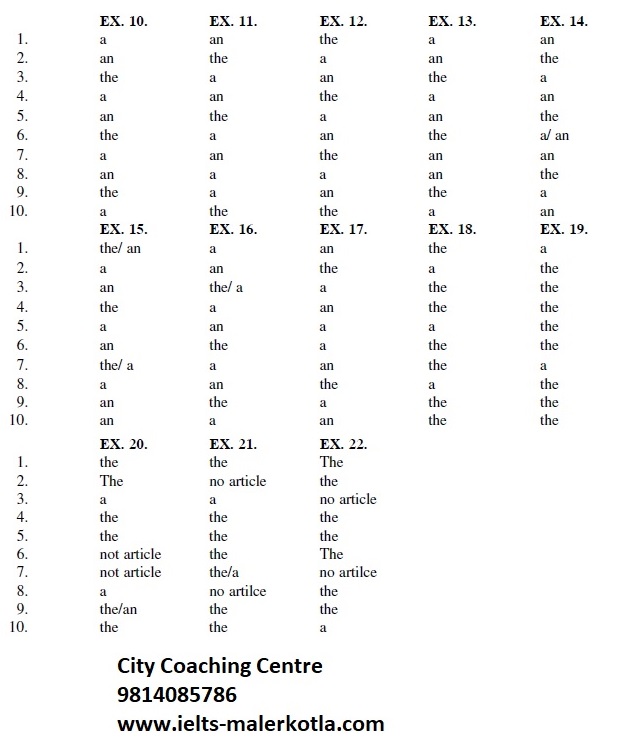
- Preference Sentences
 Find a number of examples of Preference sentences and clear your understanding how to use correctly rather, prefer, would prefer, would rather….
Find a number of examples of Preference sentences and clear your understanding how to use correctly rather, prefer, would prefer, would rather…. - Rather / Rather than / Instead of
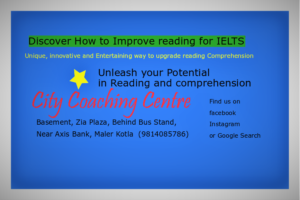 Check here a number of example sentences to know how to use Rather, Rather than, Instead of correctly. This will help you in avoiding errors in IELTS writing.
Check here a number of example sentences to know how to use Rather, Rather than, Instead of correctly. This will help you in avoiding errors in IELTS writing. - Check your grammar level in English
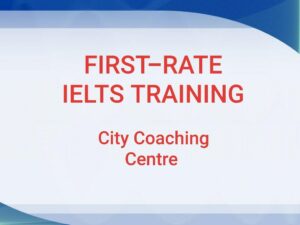 This is approximately your current level of English and you should make a plan to further improve your English.For example, if you are at Pre-intermediate level currently, you should make plan to achieve Intermediate level.
This is approximately your current level of English and you should make a plan to further improve your English.For example, if you are at Pre-intermediate level currently, you should make plan to achieve Intermediate level. - Sentences with PUT
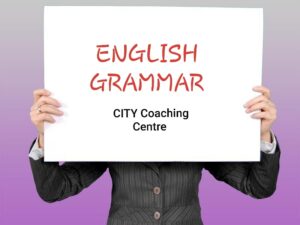 Check herein list of English sentences with PUT.Punjabi translation is also given.
Check herein list of English sentences with PUT.Punjabi translation is also given. - Sentences with “SO”
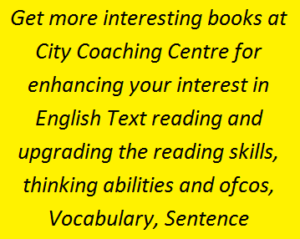 Find here a list of sentences with SO.Punjabi translation is also given for easy understanding of accurate use of word “So”
Find here a list of sentences with SO.Punjabi translation is also given for easy understanding of accurate use of word “So” - Difference between “So” and “So That”
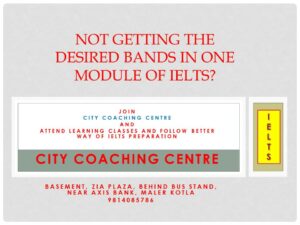 Know the difference between so and so that.As a conjunction, ‘so’ is used to show the effect or result.As a conjunction ‘so that’ is used to talk about purpose
Know the difference between so and so that.As a conjunction, ‘so’ is used to show the effect or result.As a conjunction ‘so that’ is used to talk about purpose - Sentences with BECAUSE
 Learn through example sentences how to use BECAUSE accurately.English sentences with Punjabi translation are given for easy understanding.
Learn through example sentences how to use BECAUSE accurately.English sentences with Punjabi translation are given for easy understanding. - Sentences with TAKE
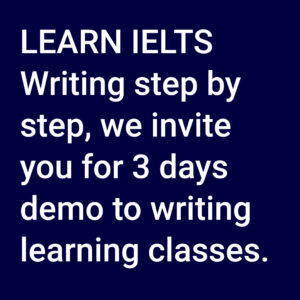 Learn through example sentences how to use TAKE accurately.English sentences with Punjabi translation are given for easy understanding.
Learn through example sentences how to use TAKE accurately.English sentences with Punjabi translation are given for easy understanding. - Sentences with MAKE
 Learn through example sentences how to use MAKE accurately.English sentences with Punjabi translation are given for easy understanding.
Learn through example sentences how to use MAKE accurately.English sentences with Punjabi translation are given for easy understanding. - Phrasal Verbs List
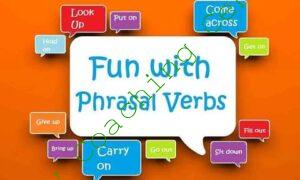 Phrasal verbs are usually two-word phrases consisting of verb + adverb or verb + preposition. Think of them as any other English vocabulary. Study them as you come across them, rather than trying to memorize many at once. Check here most common phrasal verbs with meaning and examples.
Phrasal verbs are usually two-word phrases consisting of verb + adverb or verb + preposition. Think of them as any other English vocabulary. Study them as you come across them, rather than trying to memorize many at once. Check here most common phrasal verbs with meaning and examples.
